
Libya–United States relations are the bilateral relations between the State of Libya and the United States of America. Relations are today cordial and cooperative, with particularly strong security cooperation only after the 2012 attack on the US liaison office or mission in Benghazi. Furthermore, a Gallup poll conducted in March and April 2012 found that Libyans had "among the highest approval" of US leadership in the entire Middle East and North Africa region.
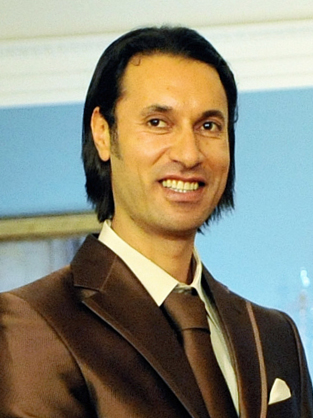
Mutassim Billah Gaddafi was a Libyan Army officer, and the National Security Advisor of Libya from 2008 until 2011. He was the fourth son of former Libyan leader Muammar Gaddafi, and a member of his father's inner circle. His mother was Safia Farkash, who was said to be a Hungarian from Bosnia and Herzegovina. He was captured during the Battle of Sirte by anti-Gaddafi forces, and killed along with his father.

The Libyan civil war or the 2011 Libyan revolution, also known as the First Libyan Civil War was an armed conflict in 2011 in the North African country of Libya that was fought between forces loyal to Colonel Muammar Gaddafi and rebel groups that were seeking to oust his government. The war was preceded by protests in Zawiya on 8 August 2009 and finally ignited by protests in Benghazi beginning on Tuesday, 15 February 2011, which led to clashes with security forces who fired on the crowd. The protests escalated into a rebellion that spread across the country, with the forces opposing Gaddafi establishing an interim governing body, the National Transitional Council.

Relations between Libya and the United Kingdom were initially close and positive after the British Armed Forces helped rebel forces to topple Muammar Gaddafi's regime in the 2011 Libyan Civil War. British officials have visited Libya several times since then, including two visits by Prime Minister David Cameron on which large crowds turned out to welcome him. The British Armed Forces are also helping to train Libya's National Army as part of wider cooperation on security matters. Security conditions have deteriorated since 2014, when the United Kingdom suspended operations from their embassy in Tripoli, into a second civil war. In June 2022, the United Kingdom re-opened its embassy in Tripoli.

Mustafa Abdul Jalil is a Libyan politician who was the Chairman of the National Transitional Council from 5 March 2011 until its dissolution on 8 August 2012. This position meant he was de facto head of state during a transitional period after the fall of Muammar Gaddafi's government in the Libyan Civil War, and until the handover of power to the General National Congress.
The international reactions to the Libyan Civil War were the responses to the series of protests and military confrontations occurring in Libya against the government of Libya and its de facto head of state Muammar Gaddafi.

Abdul Fatah Younis Al-Obeidi was a senior Libyan military officer. He held the rank of major general and the post of minister of interior, but resigned on 22 February 2011 and defected to the rebel side in the First Libyan Civil War. He was considered a key supporter of Muammar Gaddafi or even No. 2 in the Libyan government.

The National Transitional Council (NTC) was a transitional government established in the 2011 Libyan civil war. The rebel forces overthrew the Libyan Arab Jamahiriya of Muammar Gaddafi. The NTC governed Libya for a period of ten months after the end of the war, holding elections to a General National Congress on 7 July 2012, and handing power to the newly elected assembly on 8 August.
Khamis Gaddafi was the seventh and youngest son of former Libyan leader Muammar Gaddafi, and the military commander in charge of the Khamis Brigade of the Libyan Army. He was part of his father's inner circle. During the Libyan Civil War in 2011, he was a major target for opposition forces trying to overthrow his father.
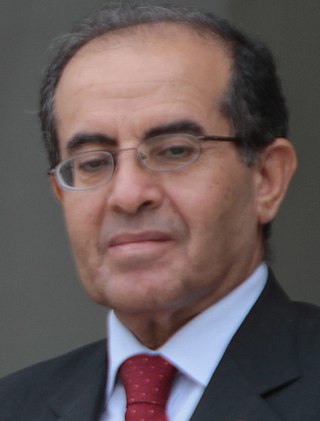
Mahmoud Jibril el-Warfally, also transcribed Jabril or Jebril or Gebril, was a Libyan politician who served as the interim Prime Minister of Libya for seven and a half months during the overthrow of Muammar Gaddafi and the Libyan Civil War, chairing the executive board of the National Transitional Council (NTC) from 5 March to 23 October 2011. He also served as the Head of International Affairs. As of July 2012, Jibril was the head of one of the largest political parties in Libya, the National Forces Alliance.

The foreign relations of Libya were largely reset at the end of the Libyan Civil War, with the overthrow of Muammar Gaddafi and the Second Libyan Civil War. The current Minister of Foreign Affairs since 15 March 2021 is Najla Mangoush. Although many foreign embassies in Tripoli closed down in 2014 due to the fighting, by the end of 2017 thirty diplomatic missions were reopened in the Libyan capital.

International recognition of the National Transitional Council of Libya was given by the majority of international states but was not universal.
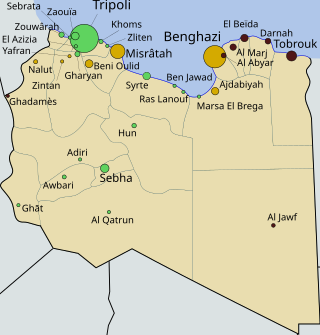
The Libyan Civil War began on 15 February 2011 as a chain of civil protests and later evolved into a widespread uprising against the regime of Muammar Gaddafi. On 25 February, most of eastern Libya was reported to be under the control of protesters and rebel forces. Gaddafi remained in control of the cities of Tripoli, Sirte and Sabha. By 15 March, however, Gaddafi's forces had retaken more than half a dozen lost cities. Except for most of Cyrenaica and a few Tripolitania cities the majority of cities had returned to Gaddafi government control.

The timeline of the Libyan civil war begins on 15 February 2011 and ends on 20 October 2011. The conflict began with a series of peaceful protests, similar to others of the Arab Spring, later becoming a full-scale civil war between the forces loyal to Muammar Gaddafi's government and the anti-Gaddafi forces. The conflict can roughly be divided into two periods before and after external military intervention authorized by United Nations Security Council Resolution 1973.

The Libyan Civil War began on 15 February 2011 as a civil protest and later evolved into a widespread uprising. However, by 19 March, Libyan forces under Colonel Muammar Gaddafi were on the brink of a decisive victory over rebels in Libya's east. That day, leading NATO members acted on United Nations Security Council Resolution 1973 which authorized member states "to take all necessary measures... to protect civilians and civilian populated areas under threat of attack in the Libyan Arab Jamahiriya, including Benghazi, while excluding an occupation force".
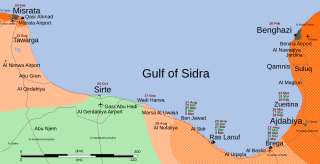
The Second Gulf of Sidra offensive was a military operation in the First Libyan Civil War conducted by rebel anti-Gaddafi forces in August and September 2011 to take control of towns along the Gulf of Sidra in an effort to surround Muammar Gaddafi's hometown of Sirte, which was held by pro-Gaddafi forces. It ended on 20 October, with the capture and execution of Muammar Gaddafi and his son Mutassim Gaddafi, along with former defense minister Abu-Bakr Yunis Jabr. The Gaddafi loyalists in the area were finally defeated when NTC fighters captured Sirte.
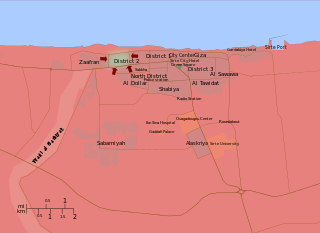
The Battle of Sirte was the final and most decisive battle of the First Libyan Civil War, beginning when the National Liberation Army attacked the last remnants of the Libyan army still loyal to Muammar Gaddafi in his hometown and designated capital of Sirte, on the Gulf of Sidra. As of September 2011, Sirte and Bani Walid were the last strongholds of Gaddafi loyalists and the National Transitional Council hoped that the fall of Sirte would bring the war to an end. The battle and its aftermath marked the final collapse of the four-decade Gaddafi regime. Both Gaddafi and his son, Mutassim, were wounded and captured, then tortured and killed in custody less than an hour later. The month-long battle left Sirte almost completely in ruins, with many buildings damaged or totally destroyed.

The 2011 Libyan Civil War began on 17 February 2011 as a civil protest and later evolved into a widespread uprising. After a military intervention led by France, the United Kingdom, and the United States on 19 March turned the tide of the conflict at the Second Battle of Benghazi, anti-Gaddafi forces regrouped and established control over Misrata and most of the Nafusa Mountains in Tripolitania and much of the eastern region of Cyrenaica. In mid-May, they finally broke an extended siege of Misrata.
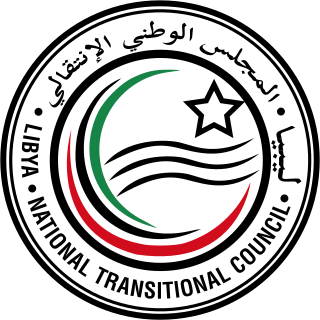
The aftermath of the 2011 Libyan civil war has been characterized by marked change in the social and political order of Libya after the overthrow and killing of Muammar Gaddafi in the civil war that was fought in Libya in 2011. The country has been subject to ongoing proliferation of weapons, Islamic insurgencies, sectarian violence, and lawlessness, with spillovers affecting neighboring countries including Mali.

The killing of Muammar Gaddafi took place on 20 October 2011 after the Battle of Sirte. Muammar Gaddafi, the deposed leader of Libya, was captured by NTC forces and executed shortly afterwards.













